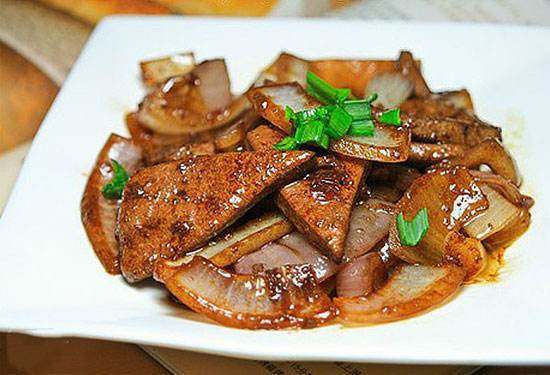Hyperlipidemia is a common chronic disease, especially among middle-aged and elderly individuals. Although common, this disease poses significant risks. Poor lipid control can lead to hardened and brittle blood vessels, resulting in arteriosclerosis. Over time, plaque dislodges from the blood vessel walls, forming blood clots, leading to vascular blockages. If a clot occurs in the cerebral blood vessels, it results in a stroke.
Therefore, if diagnosed with hyperlipidemia, it should be taken seriously, especially concerning diet. Diet is a major factor in causing hyperlipidemia. To treat hyperlipidemia, dietary adjustments are essential. Here, I will first introduce some foods that individuals with hyperlipidemia should avoid indulging in.
1. Stir-Fried Pork Liver
Stir-fried pork liver is a well-known home-cooked dish that many people enjoy and is beneficial for individuals with anemia. However, it is not suitable for those with high blood lipids. Consuming large amounts of pork liver can lead to vitamin A toxicity due to excessive vitamin A content in the body, which the kidneys cannot excrete.
Moreover, every 100 grams of pork liver contains over 400 milligrams of cholesterol, while the recommended daily cholesterol intake from food should not exceed 300 milligrams. Excessive cholesterol consumption can lead to arteriosclerosis and worsen cardiovascular diseases, particularly in individuals with hypertension and coronary heart disease.
2. Grilled Squid
Squid is not only nutritious and delicious but is also a popular choice for barbecues in the summer. However, individuals with hyperlipidemia should avoid excessive consumption. Every 100 grams of squid contains high levels of cholesterol at 615 milligrams, which is 40 times more than fatty meat, 44 times more than whole milk, 3.4 times more than cuttlefish, 11 times more than hairtail fish, 7.7 times more than chicken breast, 7 times more than lean pork, 6.15 times more than lean lamb, and 6.75 times more than lean beef. While squid is delicious, it is not suitable for everyone. Individuals with hyperlipidemia, high cholesterol, arteriosclerosis, cardiovascular diseases, and liver conditions should consume it cautiously.
3. Egg Yolk Pastries
Egg yolk pastries are rich and flavorful Chinese pastries with a crispy crust, a soft and savory filling, and a salty egg yolk center. While they are delightful, they are high in calories and cholesterol, making them unsuitable for individuals with hyperlipidemia. Therefore, indulging in these pastries is not recommended.
These are some foods that individuals with hyperlipidemia should avoid. Next, I will introduce some natural ingredients that can help lower blood lipids and dissolve blood clots. Incorporating these into your diet regularly can be beneficial.
1. Rubus Tea
Rubus tea contains various flavonoids, organic acids, 15 amino acids, as well as calcium, magnesium, potassium, zinc, manganese, iron, selenium, and other trace elements. The active compounds in Rubus tea act as a biological detergent for the blood. Regular consumption significantly improves blood vessel fragility and permeability, cleanses the blood, delays blood vessel aging, and has notable effects on hypertension, cardiovascular diseases, asthma, insomnia, chest tightness, constipation, and more. Experts refer to it as a “green cleanser and blood vessel softener for the human body.”
2. Oats
Oats are rich in linoleic acid, accounting for 35%-52% of all polyunsaturated fatty acids, and are also rich in vitamin E and saponins. These compounds help lower plasma cholesterol levels.
3. Chinese Yam
The mucoprotein in Chinese yam prevents fat deposition in the cardiovascular system, maintains blood vessel elasticity, prevents arteriosclerosis, reduces subcutaneous fat deposition, and avoids obesity. The dopamine in Chinese yam dilates blood vessels and improves blood circulation. Chinese yam also enhances digestion. For those with poor digestion, a combination of Chinese yam, lotus seeds, coix seed, and a small amount of sugar can be boiled and consumed.
4. Coix Seeds
Coix seeds lower blood lipids and blood sugar, promote metabolism, have diuretic effects, improve edema, are low in calories, prevent weight gain, contain abundant water-soluble fiber to alleviate constipation, and eliminate accumulated toxins in the body.
5. Pomelo
In traditional Chinese medicine, pomelo is deemed sweet, sour, cold, and has remarkable benefits for invigorating the stomach, aiding digestion, resolving phlegm, relieving asthma, and combating alcohol intoxication. Modern medical research shows that pomelo promotes stomach health, moistens the lungs, nourishes the blood, cleanses the intestines, aids in defecation, accelerates wound healing, and provides beneficial support for conditions like septicemia, alongside other positive effects.


